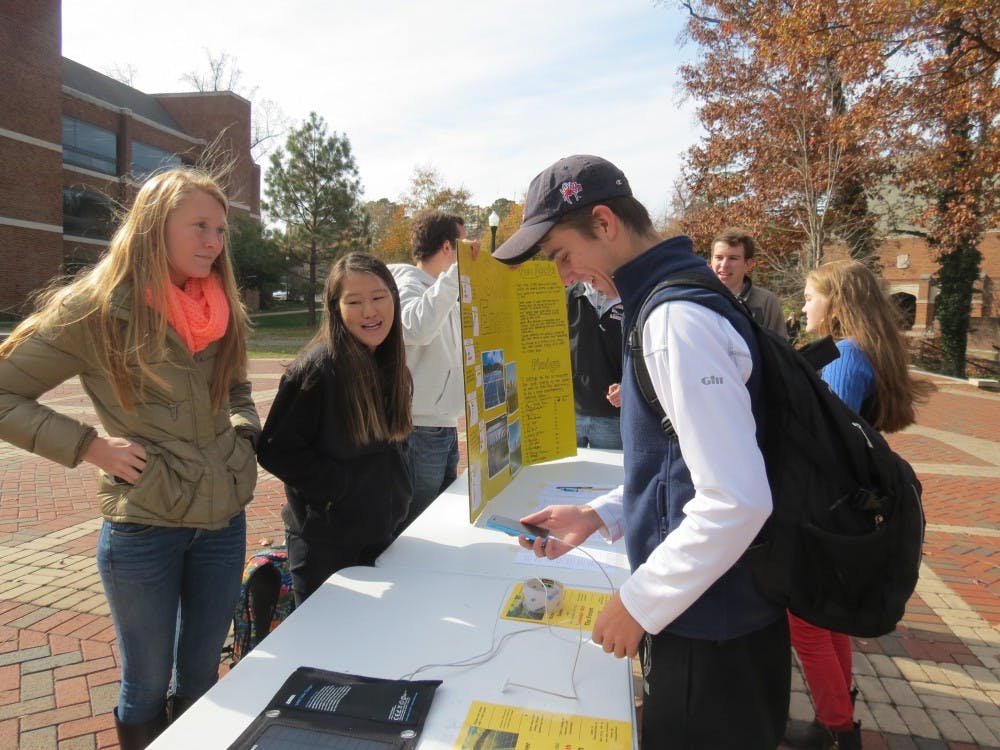Students enrolled in Green Schools First-Year Seminar spent Tuesday, Nov. 18 discussing solar energy and sustainable transportation systems in a series of student presentations and at an information table in the University Forum.
Students in the FYS, which focuses on measures taken on university campuses around the world to be more sustainable, gave presentations in the Gottwald Auditorium that included a video about the university Parking Lot Project, as well as a discussion about integrating solar panels into university energy plans. They also braved Tuesday’s chilly breeze to discuss solar power in the Forum.
Mary Finley-Brook, the professor who teaches the FYS, originally taught the class as a senior seminar, but found that galvanizing outbound seniors left little time for their campus sustainability proposals to take root. “So I transitioned it to an FYS, and one of the things I love about it is looking at students in their first semester of college, and seeing how engaged they are, and just imagining what they’re going to be doing in two years,” Finley-Brook said.
Students in the class said they had been motivated to advocate for both big and little shifts in the university’s energy policies and student behavior. One example of this is “trayless dining” at the Heilman Dining Center.
“Normally we just grab our trays and fill them up with food,” Haley Close, Westhampton College ’18, said. “If there weren’t as many trays, if you only have a plate … you wouldn’t be wasting as much food, you wouldn’t be wasting water to clean the trays. It’s interesting how little things like that, like trays, can really make a difference.”
Others emphasized the role universities have to play in a world threatened by a detrimentally shifting climate. “A few of our readings have focused on how higher education has an ethical responsibility … that there’s a sense of urgency because of how climate change will play out,” Jacqueline Sinnott, WC ’18, said.
Finley-Brook said the class centered on institutions of higher education as environmental advocacy leaders. “Some of the most important elements for a university are both educational leadership and moral leadership – sending the right message of transitioning away from fossil fuels and finding alternative energy sources,” she said.
Half of the class presented about the Parking Lot Project, which is a collaborative effort to turn parking spots in the Chapel Lot into spaces for artwork and contemplation of our dependence on fossil-fuel based transportation. The group made a video about some of the project’s noteworthy artwork, and discussed methods that other universities had used to mitigate the environmental impacts of parking lots. Parking lots contribute to runoff of vital water supplies and increase soil erosion, which can affect local ecosystems as well as human health.
The other half of the class presented on the pros and cons of solar energy and how the university community currently feels about incorporating solar power. The presentation included a video that can be viewed here.
“Part of the reason that we focus on solar is that it’s a very popular form of renewable energy, and it’s a hands-on way for people to connect with the environment around them,” Finley-Brook said. “But it’s also not very efficient, and there are a lot of problems with it. So it’s a good opportunity for students to do critical analysis of what energy sources are the best.”
The presentation featured discussions about areas where Richmond had already implemented solar power and plans to continue doing so in the future. Such measures are sometimes easier said than done, said Andrew McBride, associate vice president for campus facilities, who attended the presentation.
McBride said past efforts to incorporate solar hadn’t made enough financial sense. “We were looking at it strictly from an economic point of view, and we were looking at 20 years for a payback. … We just couldn’t make the numbers work [in 2011],” he said.
Enjoy what you're reading?
Signup for our newsletter
But with a new solar power purchasing agreement, which allows the university to buy solar power from a contractor that maintains the panels, McBride said solar panels on the roof of the Weinstein Center would be operational around February 2015. “We’re crossing our fingers that it will be a success,” McBride said.
All in all, Finley-Brook said she thought the FYS would be beneficial by promoting the university’s sustainable future through getting more students involved. “It’s been really amazing to see some of the students who have gone through this Green Schools class, and by the time they’re sophomores or juniors or seniors, they’re starting clubs and running programs and are engaged in every imaginable way as leaders on issues of renewable energy and sustainability,” she said.
Contact reporter Chase Brightwell at chase.brightwell@richmond.edu
Support independent student media
You can make a tax-deductible donation by clicking the button below, which takes you to our secure PayPal account. The page is set up to receive contributions in whatever amount you designate. We look forward to using the money we raise to further our mission of providing honest and accurate information to students, faculty, staff, alumni and others in the general public.
Donate Now



